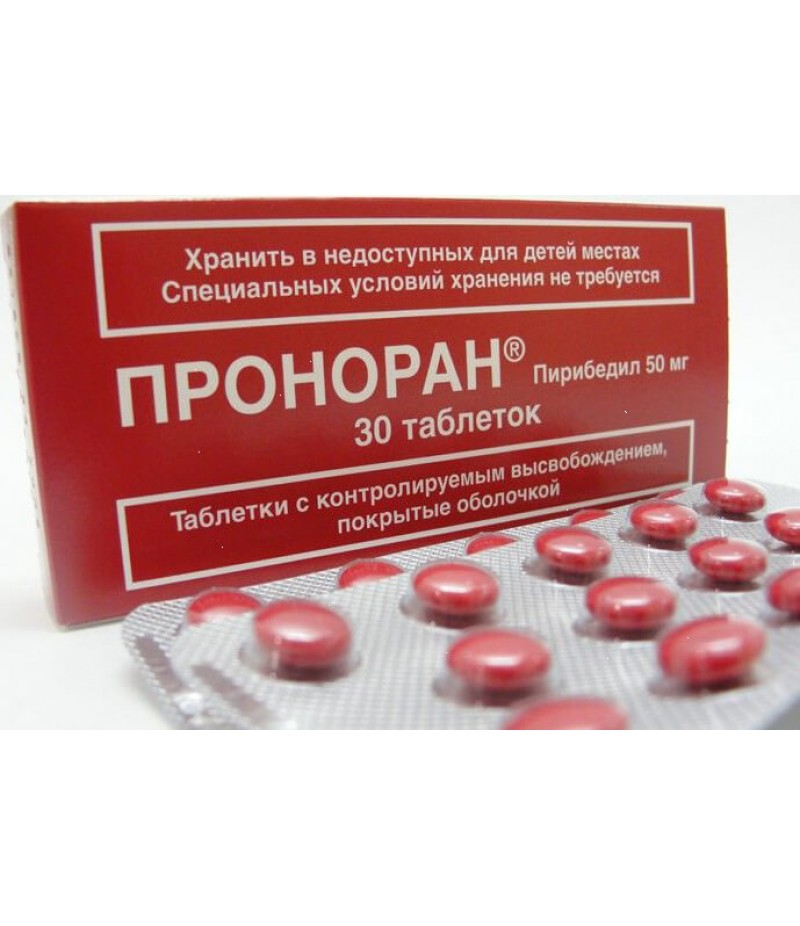Pronoran tabs 50mg #30
- $31.61
- 3 or more $29.99
- Availability:In Stock
User manual for PronoranTo buy Pronoran tablets just add it to your cartCompositionIn 1 tablet of the drug Pronoran contains 50 mg of piribedil.Additional substances: povidone, carmellose sodium, crimson dye, magnesium stearate, b..
Tags: tabs
User manual for Pronoran
To buy Pronoran tablets just add it to your cart
Composition
In 1 tablet of the drug Pronoran contains 50 mg of piribedil.
Additional substances: povidone, carmellose sodium, crimson dye, magnesium stearate, beeswax, sodium hydrogen carbonate, silicon dioxide, polysorbate 80, sucrose, titanium dioxide, talc.
Form of issue
Red biconvex tablets of circular shape with controlled release. A slight heterogeneity of coloring, gloss and presence of inclusions is allowed. 30 tablets in a blister - 1 blister in a cardboard box.
pharmachologic effect
Antiparkinsonian action.
Pharmacodynamics and pharmacokinetics
Pharmacodynamics
INN (International Nonproprietary Name) is piribedil. Stimulator of dopaminergic receptors. Passes through the blood-brain barrier and reacts with dopaminergic receptors of neurons, demonstrating high affinity and selectivity with respect to D2 and D3 receptor types. It shows antagonism with respect to α2A and α2C types of adrenergic receptors. Long-term use of piribedil leads to a less strong dyskinesia than Levodopa, with comparable efficacy against temporal akinesia against Parkinson's disease.
In healthy patients, piribedil enhances the attention and vigilance needed to solve cognitive tasks.
The effectiveness of the drug in the treatment of Parkinson's disease is proved in the results of 3 blind double clinical placebo-controlled studies.
The presence of dopamine receptors in the vessels of the legs explains the vasodilating action of pyribedil.
Pharmacokinetics
Quickly and fully absorbed from the intestine and actively distributed.
The highest content of pyribedil in the blood is reached after 4-5 hours after ingestion. Reaction with plasma proteins is 20-28%. The risk of interaction with the use of pyribedil with other drugs is low due to its poor binding to blood proteins.
Steady concentration of the active substance is maintained in the blood throughout the day. The elimination half-life is approximately 12 hours. Intensively transformed in the liver and evacuated mainly with urine in the form of metabolites.
Indications for use
Ancillary symptomatic treatment for chronic cognitive impairment and neurosensory deficit developed during aging (including attention and memory impairment).
Monotherapy of Parkinson's disease (with forms mostly characterized by tremor) or as part of multicomponent therapy with levodopa at different stages of the disease.
Auxiliary symptomatic treatment for intermittent claudication due to obliterating lesions of the arteries of the legs.
Treatment of symptoms of ophthalmic diseases of ischemic genesis (including weakening of visual acuity, decrease of visual field, decrease in contrast of vision).
Contraindications
collapse;
myocardial infarction in acute phase;
simultaneous administration with neuroleptics (not including clozapine);
age younger than 18 years;
allergy to substances that make up the drug;
deficiency of sucrose isomaltase;
intolerance to glucose, fructose, or galactose.
Side effects
Adverse reactions have a moderate nature, develop mainly at the beginning of treatment and disappear after the withdrawal of Pronoran.
Reactions from digestion: nausea, flatulence, vomiting.
Reactions from the nervous activity: agitation, confusion, hallucinations, dizziness, drowsiness, sudden falling asleep.
Reactions from the circulation: orthostatic hypotension, arterial hypotension, lability of blood pressure.
Allergic reactions: there is a risk of allergy to the crimson dye, which is part of the drug.
Behavioral disorders: addiction to gambling, compulsive overeating, increased libido, obsessive desire to commit acts of purchase, hypersexuality.
Instructions for the use of Pronoran (Method and dosage)
Tablets are recommended to be taken orally, after prima, without chewing and drinking 100 ml of water.
When monotherapy Parkinson's disease is prescribed 150-250 mg of the drug per day, which is divided into 3 divided doses. If you need to take 250 mg of Pronoran, then it is recommended to perform the dose division as follows: 100 mg is taken in the morning, another 100 mg is taken at lunch and 50 mg of the drug is taken in the evening.
For all other indications (excluding Parkinson's disease), the drug is prescribed to take 50 mg once a day. If necessary, it is permitted to increase the dosage to 100 mg per day, which is divided into 2 doses in the morning and evening.
When used in combination with levodopa preparations, the daily dose is 150 mg, which is divided into 3 divided doses.
When performing a dose adjustment in the direction of increase, the dose should be titrated, slowly increasing it by 50 mg every 14 days.
Overdose
Signs of an overdose: vomiting, unstable blood pressure, the phenomenon of dyspepsia.
Treatment of an overdose: immediate withdrawal of the drug, symptomatic therapy.
Interaction
Simultaneous reception with neuroleptics (except for clozapine) is contraindicated because of the mutual antagonism of the action.
Patients with extrapyramidal syndrome, triggered by neuroleptics, should be treated with anticholinergic drugs and it is not recommended to prescribe antiparkinsonian dopaminergic drugs.
The drug is able to induce or stimulate the development of psychotic disorders. If it is necessary to prescribe antipsychotics for persons with Parkinson's disease and who are taking anti-Parkinsonian dopaminergic drugs, the dosage of the antipsychotic drugs should be slowly lowered until complete withdrawal (prohibition of abrupt withdrawal of these drugs is associated with a risk of malignant neuroleptic syndrome).
Due to the mutual antagonism of antiparkinsonian dopaminergic drugs and Tetrabenazine, their joint use is not recommended.
Care should be taken when using pyribedil with other medications demonstrating sedation.
Storage conditions
When storing special conditions is not required. Keep away from children.
Shelf life - 3 years.
special instructions
In a number of patients (mainly those suffering from Parkinson's disease), due to taking piribedil, a state of drowsiness may suddenly occur, or even suddenly fall asleep. This phenomenon is very rare, but patients managing motor transport should be warned about the possibility of its development. When such reactions appear, consideration should be given to reducing the dosage of piribedil or completing therapy with it.
Given the age of patients receiving treatment with pyribedil, the probability of falls caused by arterial hypotension, sudden falling asleep or confusion should be considered.
Patients and their guardians should be warned about possible behavioral disorders (increased libido, gambling, compulsive overeating, hypersexuality, obsessive desire to make purchases) when using the drug. When such reactions appear, consideration should be given to reducing the dosage of piribedil or completing therapy with it.
Children
Contraindicated persons under the age of 18 years.
With alcohol
It is prohibited to take piribedil with alcohol at the same time because of the high probability of side effects.
In pregnancy and lactation
Due to lack of sufficient information, the drug should not be given during pregnancy and during lactation.
Reviews of Pronoran
Reviews of Pronoran on the forums are very few (partly that the treatment is prescribed mainly to the elderly) and contradictory, which does not allow to form a full picture of the effectiveness of the drug. However, it can be said that the occurrence of all sorts of side effects when taking the described agent is not a rare phenomenon. In any case, the selection and evaluation of the effectiveness of medicines, especially in the treatment of Parkinson's disease, should be handled by an experienced specialist.


